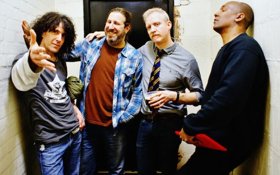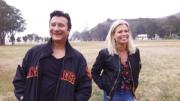New York, NY (Top40 Charts) Thirty years. It's an eternity in rock 'n' roll, and a marathon for the bands who fly its tattered flag. Revisit the class of 1988, and the casualties are piled high: a thousand bands that blew up and burnt out. In this chew-and-spit industry, the
Spin Doctors are the last men standing, still making music like their lives depend on it, still riding the bus, still shaking the room. They've never been a band for backslaps and self-congratulation. Even now, plans are afoot for a seventh studio album and another swashbuckling world tour, adding to their tally of almost two thousand shows. But faced with that milestone, even a band of their velocity takes a breath for reflection. "I'd never have guessed," admits drummer
Aaron Comess, "this would have turned into thirty years of making great music together."
Like all the best rock 'n' roll mythology, the final page of the Spin Doctors' biography remains forever unwritten. But if the band's story is to begin anywhere, it should be at New York's New School university in the fall of '88, when a fateful door-knock sparked the first meeting of Comess and guitarist Eric Schenkman. Trading as the Trucking Company, Schenkman, local legend John Popper and a charisma-bomb vocalist named Chris Barron had been making a glorious noise in the clubs downtown. But when Popper committed himself to Blues Traveler, the remnants sought new blood. Having assured Schenkman that he'd "check them out," Comess formed a ferocious rhythm section with Bronx-raised bassist Mark White. "When I first met them," recalls White, "I thought, 'These are some funky-assed white boys.' I'm the black guy in the band, and they had to teach me to play the blues."
The nascent
Spin Doctors lineup hit the Lower Manhattan blues circuit like a wrecking ball. Flexing their musicianship and announcing their elastic approach to live performance with jams that stretched to the outer reaches, the lineup's glorious ability to supercharge a tune was in evidence on 1991's debut live release, Up For Grabs, where some tracks stormed beyond ten minutes. They didn't know it yet, but the
Spin Doctors - alongside peers like Blues Traveler,
Phish and
Widespread Panic - would drag the jam-band ethos into the '90s era, their DNA later dripping into the scene's post-millennial resurgence. "We had a big fanbase," notes Comess, "who loved that we stretched out and jammed out and played different shows every night."
Just as important was the band's habit of bending the house rules at the downtown blues clubs by slipping in their own songs alongside the rocket-fuelled standards. And it was that same flair for original songcraft that carried them into a deal with Epic Records, setting up the Pocket Full Of Kryptonite album that defined the early-'90s rock scene. "There was a feeling of magic in the band," reflects Barron, "and a belief in the air. That first record felt really innocent. Y'know, we were surrounded by millions of dollars' worth of equipment, and when we recorded "Two Princes," Eric rented a $50,000 Les Paul."
Led by relentless touring, the album sold steadily - but within a year, Epic had declared it "dead" and pushed the band to return to the studio. "But we decided to go back on the road," says Comess, "as we felt the buzz building and believed in the record. Sure enough, within a few months, Jim McGuinn up in Vermont started playing "Little Miss Can't Be Wrong" and it went to #1. He wrote to the head of Epic, telling him they'd be crazy not to push this band. That was the fuel that lit the fire."
Barron still recalls the circus when Pocket Full Of Kryptonite exploded in 1992 ("When we were selling 50,000 records a week, I'd walk into a mall to buy underwear and 300 kids would surround me"). Pass a record store and you'd hear the tills ring, as that all-conquering debut album marched towards 10 million sales. Pass a news-stand and you'd see the lineup staring back from the cover of Rolling Stone. Flick on MTV and you were serenaded by planet-straddling follow-up hit "Two Princes," whose irresistible groove and scream-it-back chorus took it to #4 on the Top 100 singles chart and more US radio spins than any other rock 'n' roll song in 1993. "When you're freaking popular," says White, "and people are throwing themselves at you, if you don't like that, you're on the wrong planet."
The numbers were staggering. But it was the Spin Doctors' capacity to reinvent themselves throughout the unfolding decade that confirmed their status as a great American band. In 1994, they struck back with Turn It Upside Down: a bitter-sweet album that has some superb songs, from "Cleopatra's Cat" to "You Let Your
Heart Go Too Fast. "
Every long-serving rock band must endure a period of stormy weather, and the
Spin Doctors have scars to go along with the award statuettes. Schenkman left before 1996's You've Got To Believe In Something, while the departure of White during 1999's Here Comes The Bride was a hammer-blow to a band that ran on chemistry. For a heartbeat in the post-millennium, this most bulletproof of bands appeared to be on the ropes, as morose nu-metal gripped the rock mainstream, and Barron was laid low by vocal cord paralysis. "You just don't know," he considers, "when life is gonna strike you with something that stops you executing your plan."
If the singer's fight back to vocal fitness was miraculous, then fewer still would have foretold the spectacle - in
September 2001 - of the classic
Spin Doctors lineup reuniting at the Wetlands club in Manhattan where they had cut their teeth. "Getting back together," remembers Barron, "was intense."
The chemistry proved too strong to put back in the box, and scattershot live shows ultimately spilled into 2005's Nice Talking To Me. "We went off to LA for that record," remembers Barron, "working in Sound City, where
Nirvana made
Nevermind and
Fleetwood Mac made Rumours. There were some cool ghosts in that studio. I really enjoyed working with Matt Wallace. That guy is a fucking genius. He made us play everything acoustic beforehand.
Aaron had no drums - Matt made him sit on the couch and pat his knees to the beat. He wouldn't even let us rehearse in electric until it worked. Which sorta reconfirmed my feeling that if a song doesn't work with just a voice and piano or guitar - then it's not a real tune."
The band's next move was as real as it gets. Faced with 2013's acclaimed sixth studio, If The River Was Whiskey, some rock journalists spoke of a change of direction. Long-term fans knew better: these gritty blues originals tipped a hat to the band's first steps on the New York circuit, managing to revisit their roots while reinvigorating their sound. "We cut that record in two days," recalls Schenkman. "It was very similar to how we initially made records, when we'd go out and play in the bars of New York, then we'd record music because we were playing so good."
"For a rock band to make a blues record is a really ballsy move," points out Barron, "but that was the best-received album we've ever done, critically. Everybody played their asses off. We all got in one room and we were just stood looking each other in the eyeballs - and just throwing down. There were old songs that we hadn't played in years, but we wrote the title track and "Some Other Man Instead" just on-the-fly in rehearsal. And the way those two new songs came together so quickly made me feel really good about our future creatively."
Long-term strategy has never been the Spin Doctors' style. While cultural commentators have long since given up plotting the trajectory of this most unpredictable band, it's a revelation to learn that the lineup themselves have no road map. "For the next album," considers Barron, "I kinda want to stay spontaneous. I'd personally like to make a quarter-turn and do a rock record. But I have a feeling it's gonna get funky. Y'know, there's that great quote from
Keith Richards when he went to meet
Mick Jagger at AIR Studios to make Steel Wheels. And he told his wife - 'I'll either be back tomorrow or in a month'. I think that's how it's gonna go for us, too."
Thirty years. A thousand twists. But whatever happens down the road, rest assured that the
Spin Doctors will always be the last men standing, still making music like their lives depend on it, still riding the bus, still shaking the room. "It's been a great ride," considers Comess. Then he adds: "So far..."





















